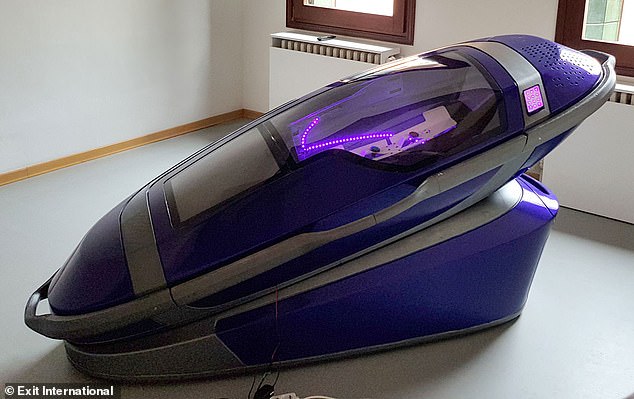Launch of space-age ‘Tesla of Euthanasia’ death capsule in Switzerland is scrapped as inventor admits ‘first patient’ – an American woman in her 50s – ‘needs psychological care rather than assisted suicide’
The launch of a “death capsule” that could perform euthanasia at the touch of a button has been “abortated”, its maker has announced.
Euthanasia expert and inventor Dr Philip Nitschke said the first person to use the device suffered from “deteriorating mental health”.
The American woman in her 50s, nicknamed Person X, was due to die on July 17, but her death in the ‘Sarco’ pod has now been ‘permanently postponed’.
“Given her situation, it is clear that this is someone who should be receiving mental health care now, rather than assisted suicide,” Dr. Nitschke said.
The controversial euthanasia advocate, who has been dubbed ‘Dr. Death’, is now said to be involved in the pre-selection of the next person to use the device.
Australian euthanasia advocate Philip Nitschke (pictured), also known as ‘Dr Death’, is a former physician and head of the voluntary euthanasia campaign Exit International

An early version of the Sarco Pod, which can be operated internally and works by lowering the oxygen level. No one has used it yet. The final prototype is in the final stages of preparation
According to Dr. Nitschke’s company Exit International, the Sarco, short for sarcophagus, is intended to allow the euthanasia patient inside to press a button and die “within seconds.”
The pod – that looks like something out of a science fiction movie and is compared to a Tesla car – is filled with nitrogen to deprive the occupants of oxygen, causing the patient to become unconscious before dying.
While the Australian researcher claims his device gives people the chance to end their lives in a “peaceful” way, pro-life groups warn the pods “glorify suicide”.
Reports last month pointed to the Sarco’s “imminent” deployment in Switzerland, with many expecting it to happen within the month.
However, Exit International claimed that the ‘media storm’ surrounding the machine had contributed to the woman’s deteriorating mental health.
Dr Nitschke said he was concerned about “multiple episodes of significant cognitive decline, bordering on pre-psychosis” as the date of the woman’s planned euthanasia approached.
On the day it was first to be deployed, euthanasia organization The Last Resort said it expected it to be deployed within a year.
Dr Nitschke said the next potential ‘patient’ who might use the machine should be made aware of possible media attention.
“Given the media attention paid to Person X, all prospective clients should be warned of the possibility that, despite our efforts to keep their death confidential, any first use of Sarco will be the subject of intense media attention and reporting,” he said.
Swiss prosecutors warned earlier this month that anyone who helps someone use the pods could face up to five years in prison.
Public prosecutor Peter Sticher of the canton of Schaffhausen warned of “serious consequences” for Nitschke because of “incitement and complicity in suicide for selfish reasons.”
Sticher wrote in a letter obtained by Swiss media: ‘There is no reliable information about the method of murder.
‘(It is) completely unclear who has control over which mechanical process during the dying process.’
Prosecutors said it would be impossible to determine who committed the murder under Article 115 of the Cantonal Criminal Code
Prospective users must complete an online survey before being given a pod’s location and an access code, similar to a mailbox for deliveries.
They then confirm in the capsule who they are, where they are and whether they know what happens when they press the button.
If they continue, a flood of nitrogen reduces oxygen levels from 21 percent to just one percent, reportedly killing them within 30 seconds.
Nitschke explained: ‘Death occurs from hypoxia and hypocapnia, respectively oxygen and carbon dioxide deficiency. There is no panic, no suffocation.’
The doctor’s plans to use Sarco for the first time have sparked outrage from pro-life organizations including CARE.
James Mildred, director of engagement at CARE, said: ‘Philip Nitschke’s device has been condemned by a wide range of commentators.
‘Many people feel that this trivializes or even glorifies suicide.
We believe that suicide is a tragedy that good societies try to prevent under all circumstances.
“There are ethical ways to help people that do not destroy lives.”

Swiss prosecutors warned earlier this month that anyone who helps someone use the pods could face up to five years in prison
The project has encountered a number of obstacles in the past, including whether Swiss authorities can take criminal action against the use of the machine.
Sarco’s founders reported in 2021 that it had passed legal scrutiny in Switzerland, where assisted suicide is legal and hundreds of people use the services of organizations like Dignitas and Exit (a separate group from Dr. Nitschke’s) every year.
But Kerstin Noëlle Vokinger, a professor of law and medicine at the University of Zurich, has said Sarco may need to be certified under the country’s Medical Devices Act, but that is not the case.
As a manufacturer, Dr. Nitschke could therefore take a risk by using Sarco if he were to be reported and a court came to the same conclusions as Vokinger, NZZ reports. A legal report previously stated that it did not violate any laws.
- For help and support you can call the Samaritans free from a UK phone line, completely anonymously, on 116 123 or visit samaritans.org.
